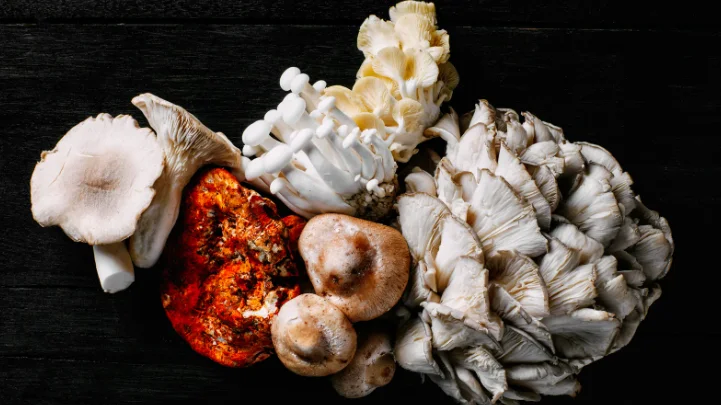Mushrooms, the fruiting bodies of fungi, play a critical role in many ecosystems and are a staple in culinary traditions worldwide. When discussing edible mushrooms, it’s essential to recognize the diversity and richness they bring to various dishes, offering unique flavors and textures that can enhance any meal. The fascination with these natural delights is not only due to their taste but also their nutritional benefits, making them a sought-after component in healthy diets.
Most Popular Edible Mushrooms
White Button Mushroom
The white button mushroom, scientifically known as Agaricus bisporus, is the most widely consumed mushroom globally. Found in grocery stores and salads, these mushrooms are appreciated for their mild flavor and versatility in cooking, from raw consumption to being sautéed, grilled, or baked.
Cremini Mushrooms
Often referred to as baby bellas, cremini mushrooms are essentially the same species as white button mushrooms but at a slightly more mature stage. They offer a firmer texture and a deeper, earthier flavor than their younger counterparts, making them ideal for heartier dishes.
Portobello Mushrooms
When mature, Agaricus bisporus takes the form of portobello mushrooms, known for their large, meaty caps. Portobellos are excellent for grilling and stuffing due to their size and robust structure, often used as a meat substitute in vegetarian and vegan recipes.
Shiitake Mushrooms
Native to East Asia, shiitake mushrooms are prized for their rich, smoky flavor and are a staple in Japanese cooking. They’re typically used in soups, stir-fries, and other dishes where their flavor can infuse into the meal. Shiitakes are also known for their health benefits, including boosting the immune system.
Nutritional Value of Mushrooms
High in Nutrients
Mushrooms are low in calories but high in essential nutrients like selenium, potassium, and vitamin D, especially when exposed to sunlight. They are also a good source of antioxidants, which protect the body from damaging free radicals.
Dietary Fiber
Mushrooms are a good source of dietary fiber, which is beneficial for maintaining gut health and helps in digestion and weight management. The fiber in mushrooms can also help to stabilize blood sugar levels.
Protein Source
Especially important for vegetarians and vegans, mushrooms provide a significant amount of plant-based protein, which is crucial for muscle repair and growth.
Vitamin and Mineral Rich
Besides vitamins and minerals already mentioned, mushrooms also contain B vitamins like riboflavin, niacin, and pantothenic acid, which help provide energy by breaking down proteins, fats, and carbohydrates.
Choosing and Storing Mushrooms
Selecting the Best Mushrooms
When shopping for mushrooms, look for ones that are firm, dry, and unbruised. Avoid mushrooms that appear slimy or have a pungent smell, as these are signs of decay.
Storage Techniques
Mushrooms should be stored in the refrigerator and kept in their original packaging or in a paper bag for breathability. It’s best to use them within a few days to ensure freshness and optimal taste.
Preparation Tips
Before cooking, mushrooms should be wiped with a damp cloth or brushed to remove any dirt. They should not be washed under running water as they are highly absorbent and will become waterlogged, affecting their texture and flavor.
Cooking Methods
Mushrooms are incredibly versatile and can be prepared in numerous ways. Whether you’re sautéing, grilling, baking, or simmering, they can adapt to various cooking methods and recipes, making them a favorite in diverse cuisines.
Frequently Asked Questions
What are the health benefits of eating mushrooms?
Mushrooms are rich in vitamins, minerals, and antioxidants, which can boost your immune system, support heart health, and improve nutrient absorption.
Can you eat raw mushrooms?
Yes, some mushrooms like white button, cremini, and portobello are safe to eat raw, but others may be more digestible and flavorful when cooked.
How do you clean mushrooms before eating?
It’s best to wipe mushrooms with a damp cloth or soft brush to remove dirt. Washing them under water can cause them to absorb moisture and become soggy.
Are mushrooms considered a vegetable?
While commonly used as vegetables in culinary contexts, mushrooms are technically fungi but provide similar nutrients to vegetables.
How long can you store fresh mushrooms?
Fresh mushrooms can typically be stored in the refrigerator for about 5 to 7 days. Keep them in their original packaging or a paper bag for optimal freshness.
Conclusion
The world of edible mushrooms offers a fantastic variety of options that cater to different tastes and dietary needs. From the ubiquitous white button mushroom to the more exotic types like shiitake, each variety brings its unique set of flavors and benefits. Whether you’re a gourmet chef or a home cook, incorporating mushrooms into your diet can enhance your meals nutritionally and gastronomically.

Melody Roth, a seasoned blog writer with a passion for the delectable world of food, specializes in crafting mouth-watering articles on favorites like pizza and burgers. With years of experience under her belt, Melody serves up stories as tantalizing as the dishes she describes, making her an invaluable voice in the culinary blogging realm.

